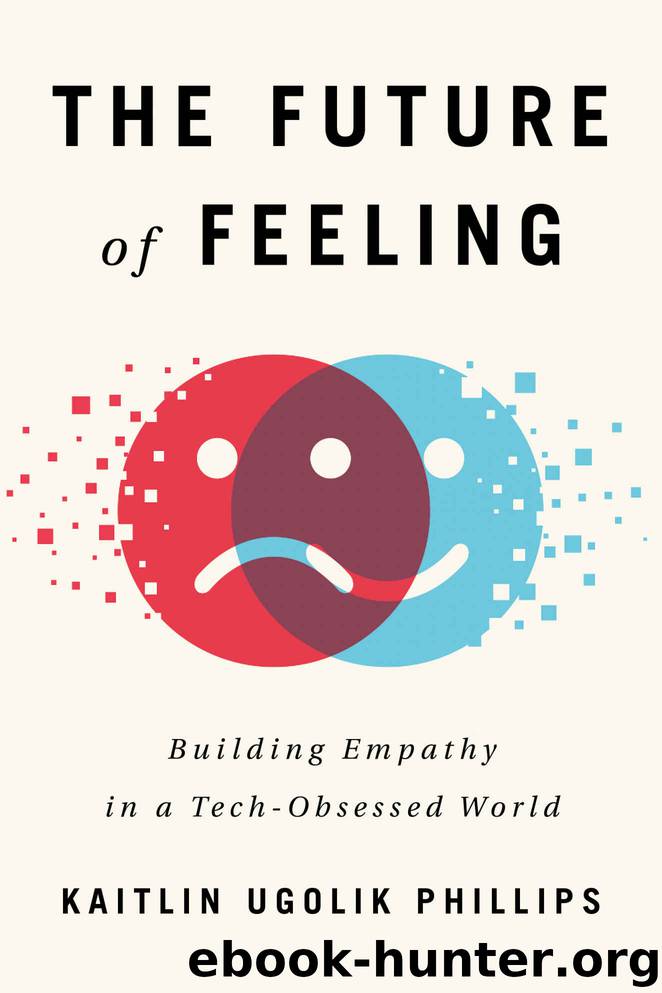The Future of Feeling: Building Empathy in a Tech-Obsessed World by Kaitlin Ugolik Phillips

Author:Kaitlin Ugolik Phillips [Ugolik Phillips, Kaitlin]
Language: eng
Format: azw3
Published: 2020-01-31T16:00:00+00:00
CHAPTER 6
FOR YOUR HEALTH
The experiences we have with doctors and nurses, the people we trust to care for us, can leave a lasting impact, for better or worse. I still remember being seven or eight years old and visiting a doctor who promised me—literally said the word “promise”—that he would not perform a swab on my sore throat, then proceeded to dive right in there and do it anyway when I unsuspectingly opened my mouth to say “ahhh.” This experience is nothing compared to the trauma that some people experience in medical settings.
Sometimes it’s because a doctor is impatient, unsympathetic, or biased. Research shows that overweight women and women of color receive some of the worst health care in general, as too many doctors insist that any malady must be related to their weight or believe that nonwhite patients require less pain relief. Other times the trauma seems inevitable, no matter how caring the clinician—as with a painful injury, an invasive surgery, or a complicated birth.
Taking care of human beings is a stressful job, especially with long hours and high-stakes settings. I’ve felt empathy myself for doctors who had to “deal with” my comparatively minor issues, and I can only imagine how frustrating it is to see the same patients with the same problems over and over, no matter what interventions are tried. As with other high-stress careers, those who work in medicine are highly susceptible to burnout, becoming so overwhelmed (and sometimes physically ill) that they can’t do their jobs, or, perhaps worse, that they do them incorrectly. To avoid this, many medical professionals learn to block out the most difficult and traumatizing parts of their work.
“After a while, you don’t hear the children crying very much,” one pediatrician told me. Another doctor—a family physician—told me he and his colleagues sometimes gossip and joke about their patients behind closed doors during long overnight shifts. “You have to blow off steam,” he said.
If the threat of burnout is ever-present, the goal—in addition to doing no harm—becomes maintaining the proper level of compassion when face to face with a patient. In the world of medicine, this can be easier said than done. A 2011 review of existing research on self-reported empathy among medical students and residents found that empathy levels declined during medical school and residency. Even students who described themselves as empathetic and enthusiastic about helping patients at the beginning of medical school often ended up feeling much more jaded and burnt out by the time they finished their residencies. This decline matters because positive patient-physician communication, in which empathy and compassion are clear, has been found to actually positively impact patients’ health. Research has shown correlations between doctor-patient empathy and better outcomes in quality of life, depression, anxiety, and even blood pressure and blood glucose levels. The authors of the 2011 review, which included eighteen studies published between 1990 and 2010, analyzed the reasons that students and residents felt their own empathy recede over the years. Each study they
Download
This site does not store any files on its server. We only index and link to content provided by other sites. Please contact the content providers to delete copyright contents if any and email us, we'll remove relevant links or contents immediately.
Hit Refresh by Satya Nadella(9138)
When Breath Becomes Air by Paul Kalanithi(8447)
The Girl Without a Voice by Casey Watson(7889)
A Court of Wings and Ruin by Sarah J. Maas(7848)
Do No Harm Stories of Life, Death and Brain Surgery by Henry Marsh(6942)
Shoe Dog by Phil Knight(5270)
The Rules Do Not Apply by Ariel Levy(4970)
A Higher Loyalty: Truth, Lies, and Leadership by James Comey(4964)
Hunger by Roxane Gay(4928)
Tuesdays with Morrie by Mitch Albom(4784)
Everything Happens for a Reason by Kate Bowler(4743)
The Immortal Life of Henrietta Lacks by Rebecca Skloot(4589)
Millionaire: The Philanderer, Gambler, and Duelist Who Invented Modern Finance by Janet Gleeson(4479)
How to Change Your Mind by Michael Pollan(4357)
All Creatures Great and Small by James Herriot(4323)
The Money Culture by Michael Lewis(4209)
Man and His Symbols by Carl Gustav Jung(4137)
Elon Musk by Ashlee Vance(4128)
Tokyo Vice: An American Reporter on the Police Beat in Japan by Jake Adelstein(3996)
